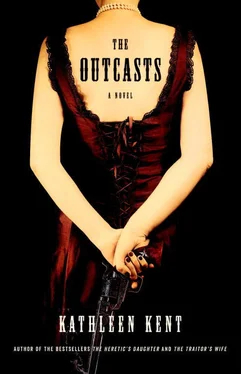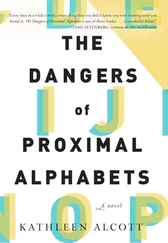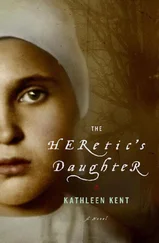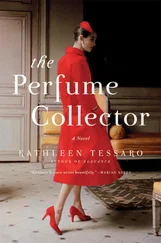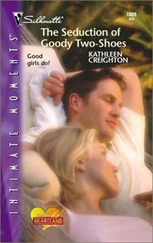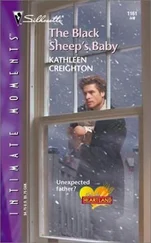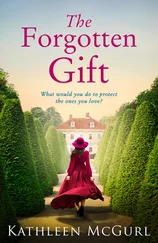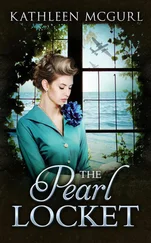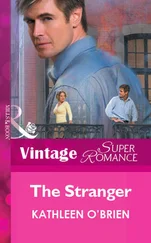He dropped her head, stood, and grabbed Alger by the back of his neck. He shook the boy and whispered, “You get out of here. Wait for me in those trees. If I’m not out in fifteen minutes, go get help.”
“From where—” the boy started, but Nate gave him a push and Alger ran, skating once on the wet marble, and slipped out the door.
Nate moved to the bottom of the stairs, straining his ears for anything to indicate someone else alive in the house. Hugging the wall, he moved up the steps onto the second floor and saw lamplight from an open door at the end of the hall. There were no sounds, no winking eclipses onto the carpet thrown by someone moving in front of the lamp. He walked carefully to the door, inhaled, and moved gun-first into the room.
It was a bedroom containing a massive canopied bed, its heavy satin covers spilling onto the floor; lying motionless on its sheets was a bulging form, fish-belly white. He approached cautiously, his shooting arm testing the room, and saw that it was a man, spread-eagled and naked, his throat cut raggedly from ear to ear. On the far side of the bed was a standing mirror, and a wan oval shape reflected in the glass composed itself into a face with staring eyes.
He wheeled around and saw in the corner opposite the bed a woman painted in blood, her dark hair wild around her head, her knees drawn up defensively to her chest. He held the gun on her for a moment, but her eyes remained fixed and unblinking and he knelt down, placing his cheek close to her mouth and nose, feeling for breath.
He felt nothing and pulled his face back to check for the identifying mark that would prove she was Deerling’s daughter. He looked in her eyes and with a jolt realized that they were now focused with calm lucidity on his own. A rasping sound from behind caused him to turn, and before he felt the blow to the side of his head, he reflexively discharged his revolver, then lay in a throbbing, half-aware state.
He was rolled onto his back, the Dance taken from his grasp, and when his vision cleared, he was looking at the man from the Lynchburg ferry crossing, now beardless and without spectacles. McGill smiled in a genial way, and Nate remembered the liking he had felt for the man, the sense of immediate kinship with a well-spoken and sympathetic traveler.
McGill hunkered down next to him, holding the gun casually, loosely, and said, “Hello, Officer.”
Nate started to sit up and McGill shook his head. He said, “That shot may or may not be answered. New Orleans has such a shocking disregard for the sounds of violence. Nonetheless, I shall be brief. I admire your tenacity. It took courage to follow me into a darkened house. But it was very foolish.
“You now have two choices. I can shoot you, and if I do so, you will die slowly and painfully. Or I can cut your throat, which will be quicker, but I can’t speak to the pain.” He smiled brightly and made a sweeping motion across his throat. “Neither could my most recent encounter. Severs the speech organ, you see.”
Nate raised his head and looked at Lucinda, whose eyes had returned to their glassy unresponsiveness. The blow had fractured his thoughts, but it was McGill’s effortless affability, driving the flow of events swiftly and cheerfully before him, like trained sheep to a corral, that made his stomach clench and heave. Nate said, “There will be others coming.”
“No. I think you are quite alone.” McGill waggled the gun like a finger. “I will give you a few more minutes to decide. Otherwise, I’ll have to choose for you.” He raised the pistol, pointed it at Nate, midbelly. “I’m sure your partner would have decided on the latter, given the opportunity. How long did it take him to die? I’ll bet it took more than a few hours.” He stood then and dragged a small dressing chair a safe distance from Nate. He sat and crossed his legs comfortably, brushing lint from his pants with his fingertips.
“Have you ever pondered your own death, Nate?” he asked. “Not death in the abstract, but the final, inevitable moment when you are confronted with the rushing formlessness of what’s coming next. How is it, do you think, that we have the will to live from day to day through the horrors of life when at the same time we are eaten away by the suspicion, or even the certainty, that after death there is only the eternal black hole?”
He rested his elbows on his knees, holding the gun between his two palms. “I think this deluded belief in an afterlife comes from God. Oh, I believe in God. Or, rather, a kind of god: a malevolent spirit, a trickster that rests in the mind like a disease and whispers to us that we do not stop but continue on in some kind of fever dream in the beyond.”
He gestured towards Lucinda. “Ask Lucy what she has seen after returning from some blasted wasteland of nonbeing. Nothing. Absolutely nothing!” He laughed and settled back into the chair. His expression grew contemplative. “In every infected mind, on every dying face, resides the stubborn hope that somehow one’s aliveness will not end. The constancy of this belief is astonishing, and really quite maddening. But I am the extinguisher of that hope.”
He stood up and pulled the chair to one side. “Do you know what I did during the war? I was an engineer, a builder. And yet, all my accomplishments—the roads, the bridges, the aqueducts—were seemingly pointless compared to the lauded feats of our butchers in the field. I killed not one person in a battle, but now I am the hunted man.” He cocked the trigger and aimed, shutting one eye in an exaggerated stance.
“It’s what I would call the greatest of social ironies.” His finger pulled the trigger, but the hammer remained fixed; there was no resulting blast, and Nate realized before McGill did that the thing that Dr. Tom had warned him about repeatedly had happened. The cap from the previous shot had split and fouled in the cylinder.
With that thought came the desperate reflex to move, but a face, haloed in dark hair, appeared behind McGill’s shoulder, and an outstretched arm pointed towards McGill’s head, the hand curled with graceful fingers around something small and metallic. A dull popping noise was followed by an explosive scattering of the top of McGill’s forehead, and he went rigid, falling to the side opposite the concussion. He convulsed for a short time and Lucinda stood and watched, the Remington remaining in her hand, until Nate could stand and yank it from her grasp.
Her lips were moving as though still in conversation with the dead man when Nate pulled back his fist to strike her, fear still coursing through his body. The remembrances of Tom’s final hours, of the German woman with the murdered children, made him not want to kill her so much as obliterate her, reduce her vacant features and slackened body to an unrecognizable heap.
Instead, he slowly unclenched his fist and took her hand, seeing for the first time that the blood matting her nightdress did not appear to be her own and most likely came from the man on the bed. He led her down the stairs and out the door, where the boy was waiting for them, still keeping vigil in the stand of sodden crape myrtles.
The boy took them to a shotgun shack on Pirate’s Alley, saying that Duverje’s men had taken up spying positions around the Buffalo House and along Canal. It was rumored that the men had orders to shoot Nate on sight, but the boy assured him that they would be safe in the house until the morning.
Nate sat by the door, unable to rest fully, and he jerked awake whenever his head began to nod into sleep. At times he watched Lucinda, lying on a nearby pallet, wearing a clean day dress brought by Alger. But her eyelids remained closed and motionless, like a person gone from the world. He had seen her eyes dim following the shooting, and he suspected she was not truly sleeping but rather retreating from the knowledge of her lover’s death, shrouding her awareness in the dark like a coal sled being shoved down into a mine.
Читать дальше
